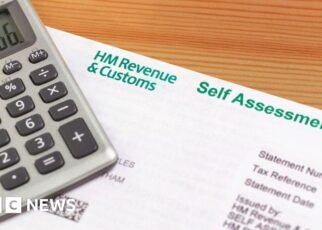[ad_1]
Labour will maintain plans for “tax rises” already announced by the Conservatives if the party wins the general election, the shadow business secretary has said.
Both parties have pledged to maintain the freeze on the personal allowance – the amount of money you can earn before any tax starts to be paid – effectively raising taxes as inflation pushes more wages above the income tax threshold.
The measure was introduced in response to Covid and is scheduled to remain for the next three years.
Labour Leader Sir Keir Starmer has maintained his party would not bring in tax rises for working people if they form the next government.
But Jonathan Reynolds said he needed to be “candid” that Labour would “inherit” and maintain the government’s plan on some tax rises.
“There are in those plans tax rises. I mean, the personal allowance we all get in terms of our income tax, that is set to be frozen for several years,” he said.
His comments come amid a continuing row about Mr Sunak’s claim that Labour’s plans would mean “£2,000 in higher taxes for every working family in our country”.
BBC analysis found the claim risked misleading voters.
The figure was based on assumptions about Labour’s spending divided by working households over four years.
The claim has also been criticised by the UK statistics watchdog and a letter from Treasury permanent secretary James Bowler said it should not be presented as civil service work.
But the Conservatives have stuck by the comment.
During the BBC’s election debate on Friday, Conservative minister Penny Mordaunt said: “Keir Starmer confirmed this earlier this week – they are going to put up your taxes by £2,000 per working household.”
Labour deputy leader Angela Rayner replied “that is a lie”, adding that the government has raised taxes to a “record level”.
Shadow chancellor Rachel Reeves had previously described the government’s decision to freeze income tax thresholds as “picking the pockets” of working people.
But in the run-up to the election, Labour vowed to maintain government tax and spending plans, instituting a “fiscal lock” requiring a forecast from the Office for Budget Responsibility for any major changes.
Currently no income tax is paid on the first £12,570 a person earns – known as the “personal allowance”.
Economic think-tank the Resolution Foundation has said plans set out in the last budget – amount to a series of tax rises that will cost the average household an extra £800 a year by 2028-29.
The biggest increase will be from the continued freezing of all income tax thresholds – not just the personal allowance. The income tax thresholds have not risen with inflation since 2021 and will likely stay fixed until 2028.
A separate think-tank, the Institute for Fiscal Studies, has warned this would bring 4.5 million more people into higher income tax thresholds by 2028.
After the election was called, Ms Reeves said she wanted the thresholds to “go up so people are not paying so much tax” but would not put forward “unfunded proposals”.
Appearing on BBC Breakfast on Saturday, Mr Reynolds admitted that Labour would push ahead with the government’s decision to freeze thresholds.
“If we were to form a government after the general election on 4 July, we would inherit the government’s spending plans,” he said.
“Now, I’ll be candid, there are in those plans tax rises. I mean, the personal allowance we all get in terms of our income tax, that is set to be frozen for several years.
“So, we are ambitious about how we think we can grow the economy to give people better times ahead, but I will be candid and say those are the plans that we would inherit.”
[ad_2]
Source link freeslots dinogame telegram营销



